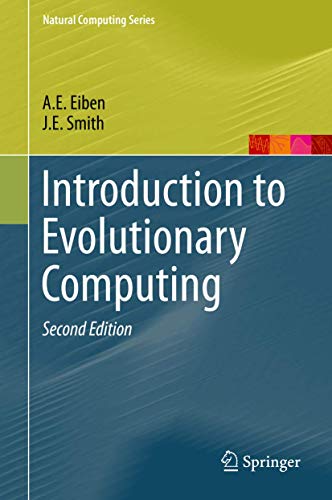
2001, ISBN: 9783662448731
[ED: Gebundene Ausgabe], [PU: Springer], Gebraucht - Sehr gut ungelesen, sehr guter Zustand; Rechnung mit MwSt.; unused/unread, very good condition; - The overall structure of this new ed… Mehr…
| booklooker.de |

ISBN: 9783662448731
[ED: Hardcover], [PU: Springer / Springer Berlin Heidelberg / Springer, Berlin], The overall structure of this new edition is three-tier: Part I presents the basics, Part II is concerned … Mehr…
| booklooker.de |

2015, ISBN: 3662448734
The overall structure of this new edition is three-tier: Part I presents the basics, Part II is concerned with methodological issues, and Part III discusses advanced topics. In the second… Mehr…
| Weltbild.de Nr. 60528825. Versandkosten:, 2-5 Werktage, DE. (EUR 0.00) Details... |

ISBN: 9783662448731
The overall structure of this new edition is three-tier: Part I presents the basics, Part II is concerned with methodological issues, and Part III discusses advanced topics. In the second… Mehr…
| wordery.com Nr. 9783662448731. Versandkosten:, , zzgl. Versandkosten. Details... |

2015, ISBN: 9783662448731
Buch, Hardcover, 2nd ed. 2015, [PU: Springer Berlin], Springer Berlin, 2015
| lehmanns.de Versandkosten:Versand in 10-14 Tagen. (EUR 29.95) Details... |


2001, ISBN: 9783662448731
[ED: Gebundene Ausgabe], [PU: Springer], Gebraucht - Sehr gut ungelesen, sehr guter Zustand; Rechnung mit MwSt.; unused/unread, very good condition; - The overall structure of this new ed… Mehr…

ISBN: 9783662448731
[ED: Hardcover], [PU: Springer / Springer Berlin Heidelberg / Springer, Berlin], The overall structure of this new edition is three-tier: Part I presents the basics, Part II is concerned … Mehr…

2015
ISBN: 3662448734
The overall structure of this new edition is three-tier: Part I presents the basics, Part II is concerned with methodological issues, and Part III discusses advanced topics. In the second… Mehr…

ISBN: 9783662448731
The overall structure of this new edition is three-tier: Part I presents the basics, Part II is concerned with methodological issues, and Part III discusses advanced topics. In the second… Mehr…

2015, ISBN: 9783662448731
Buch, Hardcover, 2nd ed. 2015, [PU: Springer Berlin], Springer Berlin, 2015
Bibliographische Daten des bestpassenden Buches
| Autor: | |
| Titel: | |
| ISBN-Nummer: |
Detailangaben zum Buch - Introduction to Evolutionary Computing
EAN (ISBN-13): 9783662448731
ISBN (ISBN-10): 3662448734
Gebundene Ausgabe
Taschenbuch
Erscheinungsjahr: 2015
Herausgeber: Springer Berlin
Buch in der Datenbank seit 2014-12-03T14:44:10+01:00 (Berlin)
Detailseite zuletzt geändert am 2024-01-31T14:41:47+01:00 (Berlin)
ISBN/EAN: 9783662448731
ISBN - alternative Schreibweisen:
3-662-44873-4, 978-3-662-44873-1
Alternative Schreibweisen und verwandte Suchbegriffe:
Autor des Buches: james smith, eiben, agoston
Titel des Buches: evolution, hypnotisirt, natural, introduction
Daten vom Verlag:
Autor/in: A.E. Eiben; J.E. Smith
Titel: Natural Computing Series; Introduction to Evolutionary Computing
Verlag: Springer; Springer Berlin
287 Seiten
Erscheinungsjahr: 2015-07-10
Berlin; Heidelberg; DE
Gedruckt / Hergestellt in Niederlande.
Sprache: Englisch
48,14 € (DE)
49,49 € (AT)
53,50 CHF (CH)
POD
XII, 287 p. 67 illus., 12 illus. in color.
BB; Hardcover, Softcover / Informatik, EDV/Informatik; Künstliche Intelligenz; Verstehen; Informatik; Estimation of Distribution Algorithms (EDA); Evolution Strategies (ES); Evolutionary Algorithm (EA); Evolutionary Computing (EC); Evolutionary Programming (EP); Evolutionary Robotics; Genetic Algorithms (GA); Genetic Programming (GP); Learning Classifier Systems (LCS); Memetic Algorithms; Optimization; Artificial Intelligence; Computational Intelligence; Theory of Computation; Control, Robotics, Automation; Optimization; Theoretische Informatik; Regelungstechnik; Optimierung; BB; EA; BC
The overall structure of this new edition is three-tier: Part I presents the basics, Part II is concerned with methodological issues, and Part III discusses advanced topics. In the second edition the authors have reorganized the material to focus on problems, how to represent them, and then how to choose and design algorithms for different representations. They also added a chapter on problems, reflecting the overall book focus on problem-solvers, a chapter on parameter tuning, which they combined with the parameter control and "how-to" chapters into a methodological part, and finally a chapter on evolutionary robotics with an outlook on possible exciting developments in this field.
The book is suitable for undergraduate and graduate courses in artificial intelligence and computational intelligence, and for self-study by practitioners and researchers engaged with all aspects of bioinspired design and optimization.
Problems to Be Solved.- Evolutionary Computing: The Origins.- What Is an Evolutionary Algorithm?.- Representation, Mutation, and Recombination.- Fitness, Selection, and Population Management.- Popular Evolutionary Algorithm Variants.- Hybridisation with Other Techniques: Memetic Algorithms.- Nonstationary and Noisy Function Optimisation.- Multiobjective Evolutionary Algorithms.- Constraint Handling.- Interactive Evolutionary Algorithms.- Coevolutionary Systems.- Theory.- Evolutionary Robotics.- Parameters and Parameter Tuning.- Parameter Control.- Working with Evolutionary Algorithms.- References.
“This book aims to give a thorough introduction to evolutionary computing, covering techniques and methodological issues. … the book does a good job of giving a general overview of the field. It assumes very little initial knowledge and the breath of its coverage is very impressive. … the supporting website does contain suggested further reading for each of the chapters.” (Barry Wilkes, bcs The Chartered Institute for IT, bcs.org, May, 2016)
“This second edition of the book under review is very timely and corresponds to Evolutionary Computation (EC)’s status as an established methodology. … The chapter subdivision into different algorithms used in the first edition … has been replaced by a more suitable student/researcher-oriented approach; this is also supported by the website www.evolutionarycomputation.org, which contains a trove of exercises, slides and extra bibliographic references.” (Anna I. Esparcia-Alcázar, Mathematical Reviews, May, 2016)
“Introduction to Evolutionary Computing is an excellent and readable text that should find a place on the bookshelf of anyone who researches and/or teaches in this domain. Suitable for a graduate course or upper-level undergraduate course in Evolutionary Computing, it is also a superior and well-organized reference book. … papers and presentations cited in the text provide a marvelous literature review. … The clarity of exposition and detail are excellent … .” (Jeffrey L. Popyack, Genetic Programming and Evolvable Machines, Vol. 17 (2), 2016)
received his Ph.D. in Computer Science in 1991. He was among the pioneers of evolutionary computing research in Europe, and served in key roles in steering committees, program committees and editorial boards for all the major related events and publications. His main research areas focused on multiparent recombination, constraint satisfaction, and self-calibrating evolutionary algorithms; he is now researching broader aspects of embodied intelligence and evolutionary robotics.
received his Ph.D. in Computer Science in 1998. He is an associate professor of Interactive Artificial Intelligence and Head of the Artificial Intelligence Research Group in the Dept. of Computer Science and Creative Technologies of The University of the West of England, Bristol. His work has combined theoretical modelling with empirical studies in a number of areas, especially concerning self-adaptive and hybrid systems that "learn how to learn". His current research interests include optimization; machine learning and classification; memetic algorithms; statistical disclosure control; VLSI design verification; adaptive image segmentation and classification and computer vision systems for production quality control; and bioinformatics problems such as protein structure prediction and protein structure comparison.
Gusz Eiben James E. SmithThe overall structure of this new edition is three-tier: Part I presents the basics, Part II is concerned with methodological issues, and Part III discusses advanced topics. In the second edition the authors have reorganized the material to focus on problems, how to represent them, and then how to choose and design algorithms for different representations. They also added a chapter on problems, reflecting the overall book focus on problem-solvers, a chapter on parameter tuning, which they combined with the parameter control and "how-to" chapters into a methodological part, and finally a chapter on evolutionary robotics with an outlook on possible exciting developments in this field.
The book is suitable for undergraduate and graduate courses in artificial intelligence and computational intelligence, and for self-study by practitioners and researchers engaged with all aspects of bioinspired design and optimization.
New edition of well-established undergraduate textbook revised to offer an integrated view on evolution-based problem-solving algorithms Includes a new chapter on evolutionary robotics Combines chapters on parameter tuning and control with "how-to" chapters in a new book part dedicated to methodology Includes supplementary material: sn.pub/extras
Weitere, andere Bücher, die diesem Buch sehr ähnlich sein könnten:
Neuestes ähnliches Buch:
2903662448730 Introduction to Evolutionary Computing (A.E. Eiben)
- 2903662448730 Introduction to Evolutionary Computing (A.E. Eiben)
- 2903540401840 Introduction to Evolutionary Computing (A.E. Eiben)
- 9783642072857 Introduction to Evolutionary Computing (Natural Computing Series) (Eiben, Agoston E.)
- 9783540401841 Introduction to Evolutionary Computing (Natural Computing Series) (Agoston E. Eiben; J.E. Smith)
- Introduction to Evolutionary Computing (Natural Computing Series) by Eiben, A.E., Smith, J.E. (2010) Paperback (A.E., Smith, J.E. Eiben)
< zum Archiv...

